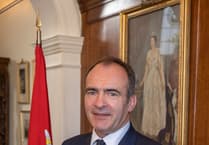The impact of the coronavirus pandemic on island life has been revealed in a statistical snapshot of economic and social data.
The numbers have been crunched on house prices, life expectancy, crime and education in a 77-page document produced by the Cabinet Office.
Figures show life expectancy is lower here than in the UK.
The Department of Health and Social Care says it is undertaking an intensive study of life expectancy and mortality.
The average life expectancy for men is 78.9 years at birth and 83.5 years at the age of 65, compared with 79.6 and 83.9 respectively in the UK.
Life expectancy for women is 83 years at birth and 85.8 years at age 65, compared to 83.2 and 86.2 in the UK.
Deaths from cardiovascular disease, cancer and causes considered preventable - which means they could potentially be avoided by public health intervention - are also higher in the island compared to England.
Between 2017 and 2019, there were 148.4 deaths from causes considered preventable, per 100,000 population, compared to 142.2 in England.
Cardiovascular mortality rates were 74.7 in the Isle of Man and 70.4 in England.
Mortality rates for all cancers were 155.6 in the island and 129.2 in England.
In other health-related statistics, the number of GPs has dropped from 46.3 in 2008 to 40.4 in 2019, while the average number of patients per GP has increased from 1,831 in 2008 to 2,173 in 2019.
The number of NHS dentists is down from seven in 2014 to 4.73 in 2019, while there’s also been a decrease in district nurses from 56 to 42 over the five-year period to 2019, and a reduction in the number of health visitors over the same period, from 17 to 14.
The population of the island stood at 83,314 in 2016, with just under half born here, and 33.9% coming from England.
The results of this year’s Census are not included in the report, so there is a time lag in some of the information.
The government says the data is in the process of being collected and compiled and will be formally published early next year, but figures have been sourced from various bodies and government departments to provide statistics up to December 2020.
House prices and wages
The average house price was £313,192 and the average price of a flat is £154,467, underliniong the difficulties being experienced by first time buyers.
The property price boom since the new year has not been included in the statistics, because they were compiled to the end of 2020.
Average weekly earnings are £788 and there were 34,860 island residents in employment in December 2020.
Although there’s been a drop in workers in the insurance, banking, finance and business sectors, these continued to account for 8,703 posts in 2016.
Topping that league are the number employed in professional, educational, medical and scientific services, at 9,430. Agriculture, forestry and fishing employees numbered 866 in 2016.
Tourist accommodation employed 1,451 at its peak in 1971.
This had dropped to 362 by 2006 and stood at 629 five years ago.
The numbers employed in construction has remained fairly stable and stood at 3,482 in 2016. Jobs in manufacturing are down from a peak of 3,562 in 1996 to 1,915 in 2016.
Illegal drugs
Cannabis bush accounted for the highest value total drugs seizure last year of almost half a million pounds.
But the amount seized dropped dramatically from the previous year.
From 2018 to 2019, 25,775 grams of cannabis bush was seized, compared to 1,089 in 2019 to 2020.
Cocaine seizures were the highest for 10 years, with 3,837 grams intercepted by police. Heroin seizures were down from 962 grams in 2018 to 2019, to 438 grams last year.
Seizure of ecstasy totalled 11,054 grams in 2018 to 2019 and dropped to 142 last year.
The weather report
The spring and summer of 2020 will be remembered for lockdown in balmy conditions.
Although there were 190 days of rain, there were high temperatures too, with 28.9 degrees celsius recorded in July and 225.4 hours of sunshine in May.
The heaviest rainfall was recorded in October and November.
Government income
Government income totalled £1,158m for the year to March 31 2020, compared to £1,067m the previous year. Gross expenditure was £1,089m.
The number of families claiming child benefit dropped from over 10,000 in 2011 to 7,109 in 2020, a result of means testing that was introduced in 2014.
Covid-19 impact
The effects of the coronavirus pandemic are reflected in the report.
Fewer people got married in 2020.
Church weddings dropped to 11, there were 130 civil weddings, reflecting the rising popularity of this form of ceremony, and six civil partnerships.
The number of new passports issued dropped by more than 50%, from over 9,000 in 2018 to 2019 to 4,084 in 2019 to 2020.
New immigration applications also dropped but there was an increase in ’indefinite leave to remain’ applications.
The impact of Covid on mental health could explain a leap in the number of people seeking help for alcohol-related issues.
In 2018 to 2019, mental health services were involved with 68 alcohol cases. The figure for 2019 to 2020 was 143.
Drugs referrals dropped from 207 to 127 over the same period.
And road traffic accidents decreased over the year in which a 40mph temporary all-island speed limit was introduced because of the pandemic, although road accidents have been gradually decreasing since 2016.
Unemployment spiked at the start of 2020 but steadily dropped over the course of the year. In December 2020 unemployment stood at 1.8%.




